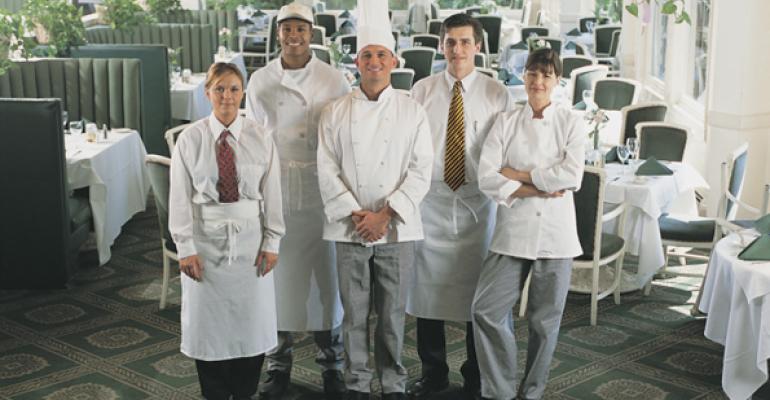
One of the fascinating dichotomies of a bar or restaurant is that it takes a ton of work to run them well, but to the guest’s view, that work is nearly invisible; it all just seems natural and effortless.
The best managers on the floor are like ducks: Above water, they are poised and steady, but below the surface, they are flapping their feet like mad. Call it good theater, call it smoke-and-mirrors, or just call it good business — the hospitality industry is an art that disguises itself.
No on can do that alone, and Jeff Benjamin, founder and chief operating officer of Vetri Family restaurants in Philadelphia (Vetri, Osteria, Pizzeria Vetri, Alla Spina, Amis and Lo Spiedo) said one of the greatest challenges in the business is managing staff.
“What you can’t possibly fathom without having experienced it firsthand is how to deal with and understand the personalities of all of the staff involved in a restaurant, from chefs to servers. There is really no ‘one size fits all’ application,” Benjamin said.
John Meadow, founder of LDV Hospitality, a New York City-based company with 20 restaurants and bars across the country — including D.O.C.G. Enoteca in Las Vegas, the Regent Cocktail Club in Miami, and Barchetta in New York — said restaurant management requires “having empathy for your co-workers, and staff, and most importantly for your guests; understanding how they think and feel, so as to be able to truly serve them.”
Focus on attitude
When hiring new managers, Benjamin and Meadow look for how the candidates approach their work and the attitude with which they lead their team.
Meadow said that the two most important qualities in a manager are presence and humility.
“There are a lot of passionate people with presence, but they are too cocky or self-absorbed to have true empathy,” he said. “Likewise, there are many people passionate about food and wine that don’t have the presence to shape magical hospitality experiences. You need both.”
Antonello Paganuzzi has them both, he said. Now LDV’s director of operations, Paganuzzi started working as a teenager at the legendary Le Cirque in New York City, and has the spirit of hospitality in his blood. His mere presence alone “sets the cultural tone of our company,” Meadow said.
Benjamin said he also steers the conversation toward attitude when sitting down with a new manager.
“Remember the difference between taking yourself seriously and taking yourself too seriously,” he said. “We are in the business of bringing enjoyment to people, so you have to bring an enjoyable attitude to those around you. There is no greater way to instill a sense of ownership, humility, and dignity in a staff member than to illustrate that no job within the organization is above or beneath you. I always tell the story of how whenever we open a new restaurant, chef Marc Vetri ends up washing dishes for the first couple of nights. The illustration it gives to new hires is invaluable.”
Take time to listen
Meadow said there is much to focus on in his job, but he reminds himself daily of cultivating “patience, patience, patience — to slow down and wait for the right partners, the right chef, the right circumstances and, ultimately, the patience to never waiver on one’s standards. And everyone makes fun of me for wasting time with too many meetings with random people, be they young entrepreneurs or old friends. But I always make time to meet with good people, regardless of an agenda. I have gotten the best results from the most seemingly random meetings. If you show up and present yourself to the world, opportunities will present themselves to you.”
Benjamin said, “You never stop learning in this business. Every day offers a new opportunity to decide how, or how not, to do something.”
Focus on people and the money will follow
Ultimately, being profitable is a big concern for any operator, and getting there requires navigating a challenging road map, with many paths to travel and learn from, and constant reevaluation of priorities. But above all, Meadow said, success will come if you put “the customer’s desires first in every aspect of the planning, development, and operations” and to “hire great people and take care of them.”

What is the best advice you have received during your time in the restaurant industry? Join the conversation in the comments below.
Benjamin agreed: “Managing costs is something every business owner should do,” but if one truly wants to be successful, then focus on “guest and staff satisfaction. We serve people, not numbers, and the value of a happy customer can be exponential. And keeping a happy and healthy staff comes back tenfold, especially when it comes to costly turnover rates. Having an open door policy with employees who can come talk to you makes them happier and more confident, and leads to greater efficiency. Daily pre-shift meetings that are productive and fun have the same effect. I am constantly amazed at how non-financial endeavors affect the bottom line.”
Both Meadow and Benjamin said that making people happy can be the greatest reward in the business.
“I had glamorous visions of what it would be like to be a restaurateur, that often revolved around socializing with guests,” Meadow said. Although the business has proved to be as exciting as he hoped, he said the high points come more from “finding communal success with my staff rather than with my guests.”
“When a staff member tells me how much they love working at our restaurant, or when a guest says our place is their favorite spot in the city, that carries me through to the next day,” Benjamin said.

